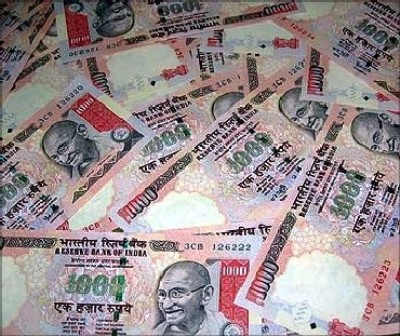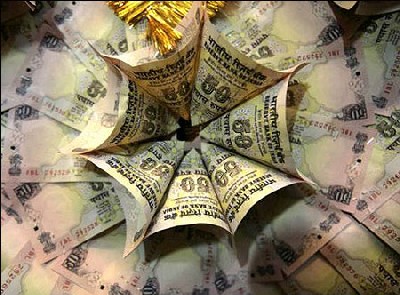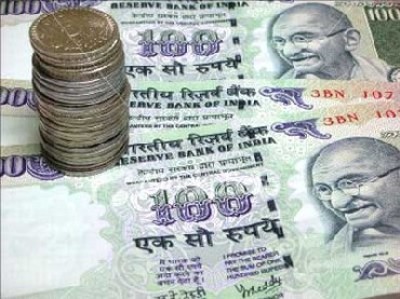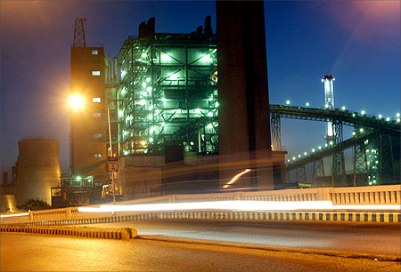 | « Back to article | Print this article |
Budget: Economists want focus on infra, investment, fiscal deficit
Economists want Budget to focus on infrastructure, have a clear strategy on disinvestment and state measures to boost investment climate. Power and social sectors should also be among the major focus areas, they said.
A meeting of economists with Finance Minister Pranab Mukherjee scheduled on Sunday has been postponed to the first week of February according to finance ministry officials.
Rajiv Kumar, secretary general FICCI, who will be attending the pre-budget meeting of FM with economists, said, "It should not be a routine budget, which is a bland and large statement of accounts, but rather have policy announcements, which will change the mood of the country".
For Rediff Realtime News, click here
Click NEXT to read more...Budget: Economists want focus on infra, investment, fiscal deficit
Kumar asks for a serious effort at containing fiscal deficit, but not by raising taxes, but by raising non-tax revenue. "Raising taxes will prove counter-productive, as increase in indirect taxes will kill demand, while increase in direct taxes will impact investment", he says.
"In this Budget, I expect the government to have a clear disinvestment plan," said Anis Chakravarty, director, Deloitte Haskins and Sells. The government need to prune fiscal and current account deficits in a more effective manner, he adds.
The subsidy target overshot by almost 1 lakh crore this financial year with another supplementary expected to come in the Budget session of Parliament.
Click NEXT to read more...
Budget: Economists want focus on infra, investment, fiscal deficit
Divestment target of Rs 40,000 crore (Rs 400 billion) seems far-fetched despite the government trying innovative methods to sell equity in PSUs.
According to FICCI's Kumar, instead of relying on markets for disinvestment, it should look for a strategic partner to sell assets like Ashoka Hotel or Air India.
Shubhada Rao, chief economist, YES Bank, says: "Divestment should not be looked at as ad-hoc approvals, but we should have a policy approach towards it."
CARE Ratings, chief economist, Madan Sabnavis, wants divestment to be kept out of the Budget purview.
Click NEXT to read more...
Budget: Economists want focus on infra, investment, fiscal deficit
"Divestment should be treated as a separate entity. The realisation of which should be targeted at infrastructure projects." The government needs to take a proactive role in infrastructure development.
Arun Singh, senior economist, Dun and Bradstreet, prescribes that that there should be more thrust on infrastructure. "The Budget should aim at improving investments in infrastructure as it has a multiplier effect on future growth."
But the major focus, according to Rao, should be on the power sector. "The Budget needs to focus on this crucial sector to revive power generation. We cannot have manufacturing growing at 12 per cent per annum unless issues in the power sector are sorted out."
Government should have a clear policy to resolve mining and coal shortage, which directly impacts manufacturing, Sabnavis notes.
Click NEXT to read more...
Budget: Economists want focus on infra, investment, fiscal deficit
Mining output in November contracted for the fourth month in a row, despite industrial production bouncing back to positive growth from contraction in the previous month.
Rao emphasises that the economy needs an environment that is conducive to revive the investment cycle. "The emphasis needs to be on policy, be it land acquisition or environment."
Given that the government subsidy expenditure spiralled out of control this fiscal, Rao says that rationalisation of this non-plan expenditure and more realistic arithmetic presentation of these negative taxes are required.
Click NEXT to read more...
Budget: Economists want focus on infra, investment, fiscal deficit
The views on pruning fiscal deficit are varied as some economists believe to much of cuts will harm the economy.
According to Sabnavis, expenditures such as subsidy on food and fuel are important as "no one else will come forward for social expenditure."
But the government has to be pragmatic and focus on project expenditure as when the economy recovers. The exchequer will be richer, and the fiscal deficit would not be so bad.
Click NEXT to read more...
Budget: Economists want focus on infra, investment, fiscal deficit
"After the 2008 crisis, we came out well. But the government started laying too much emphasis on meeting fiscal deficit target," says Sabnavis.
He suggests that the government follow the Keynesian model and give fiscal stimulus to get out of low equilibrium growth. "A fiscal deficit between 5 per cent and 5.5 per cent of the GDP will be alright."
The government needs to take a firm stand on if it wants to decontrol petrol prices or not.
Click NEXT to read more...
Budget: Economists want focus on infra, investment, fiscal deficit
"The present situation is only creating confusion. Oil companies want to increase the price, but the government cannot afford to do that due to elections. The government needs to be sure which side to support," adds the CARE Ratings chief economist.
According to Dun and Bradstreet's Singh, given that we have a problem of fiscal deficit and expenditure overruns, government should announce policies to attract private investment in the social space.
"We have private players investing in infrastructure but not in social sector. It should come out with a concrete policy with structural vision," he adds.








